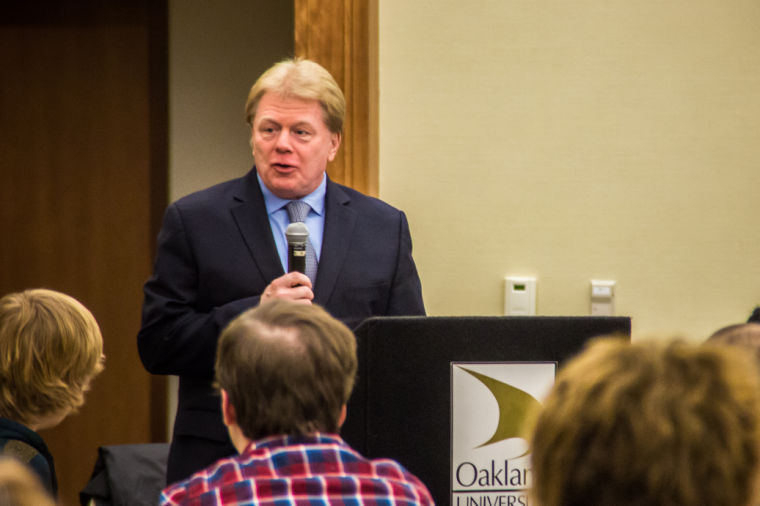Judy Garland biographer John Fricke presents at OU
Judy Garland biographer John Fricke lectures on the life and legacy of the performer on Tuesday, April 1. “Hollywood didn’t know what to do with a twelve, thirteen-year-old girl who could sing like a 30-year-old woman,” he said.
She taught children and adults alike the importance of home and that if you are ever lost, just follow the yellow brick road. She dreamed of a life somewhere over the rainbow. She is Frances Ethel Gumm, otherwise known as Judy Garland.
John Fricke, biographer and expert on all things Judy Garland, in conjunction with Oakland University’s Classical Hollywood Club, gave a lecture on Judy Garland on Tuesday, April 1.
Fricke is the author of Judy Garland: World’s Greatest Entertainer and The Wizard of Oz: The Official 50th Anniversary Pictorial History. He has also served as a creative consultant and producer for Judy Garland documentaries, TV shows, and CD’s.
Fricke said that what set Judy apart from other Hollywood stars was that she was a “multifaceted entertainer”.
An actress, singer, and vaudeville entertainer, Fricke described her as “very gracious and anxious to help”.
Fricke said people would come from all over to hear Judy.
“To see her live was the best way to experience Judy Garland,” Fricke said.
According to Fricke, Judy’s talent was evident from a young age.
“Hollywood didn’t know what to do with a twelve, thirteen-year-old girl who could sing like a 30-year-old woman,” Fricke said.
The name “Judy Garland” was adopted for stage purposes, according to Fricke. “Judy” was chosen from a song and “Garland” was chosen after a movie critic.
As a child actress, Judy was required to have four hours of school lessons. These lessons were done on the set of whatever movie she was working on and were done whenever she had a break from shooting scenes, according to Fricke.
Fricke spoke of many of Judy’s performances, but specifically, the importance of The Wizard of Oz.
“It was really her story,” Fricke said. “Taken by the tornado of her talent.”
She had an unstable family life and there was a history of substance abuse within the family, Fricke said.
Fricke dispelled many of the popular rumors associated with The Wizard of Oz. The film was not based on the Populist theory, Shirley Temple was not the original pick for the role of Dorothy, and a munchkin did not hang himself off set, the movement or image seen is actually that of a crane flapping its wings. MGM rented birds for several of the forest scenes of the movie.
Fricke said the life of an entertainer was anything but glamorous for Judy. She was forced to have two abortions in the 1940’s because “it would interfere with her career” and in 1950 when she was 28 she was considered unemployable in the movie business.
Judy died due to an accidental overdose of sleeping pills, according to Fricke. He said because of her non-stop work schedule, Judy was forced to take medication to help her fall asleep and this turned into a dependency.
“She tried many times to rid herself of the dependence,” Fricke said.
Frick said he is so thankful he could turn his love of Judy Garland into a career.
“When you fall in love at five and it lasts all these decades, it must mean something,” Fricke said.
President of the Classical Hollywood Club Amber Stankoff shares Fricke’s love for Judy Garland.
The club is new as of this year, Stankoff said she wanted to put on an even that would “get our name out there, get us recognized.”
She said she found Fricke and his information on a Judy Garland forum and contacted him about doing a presentation at OU.
The event was co-sponsored with the Honors College, Kresge Library, and the Cinema Studies Department.
Stankoff said she was very happy with Fricke’s presentation and the experience overall.
“I really praise John, he goes beyond the tabloids, he present the truth,” Stankoff said. “After seeing the success of the event we would definitely consider doing another event like this.”
Stankoff said the club is open to anyone interested. Discussions at the meetings can range from teaching those who want to know more about classic films to “how different films were affected by production code,” she said.
The Classical Hollywood Club meets on Fridays at 1:00 p.m. in Lake Superior A in the Oakland Center.








